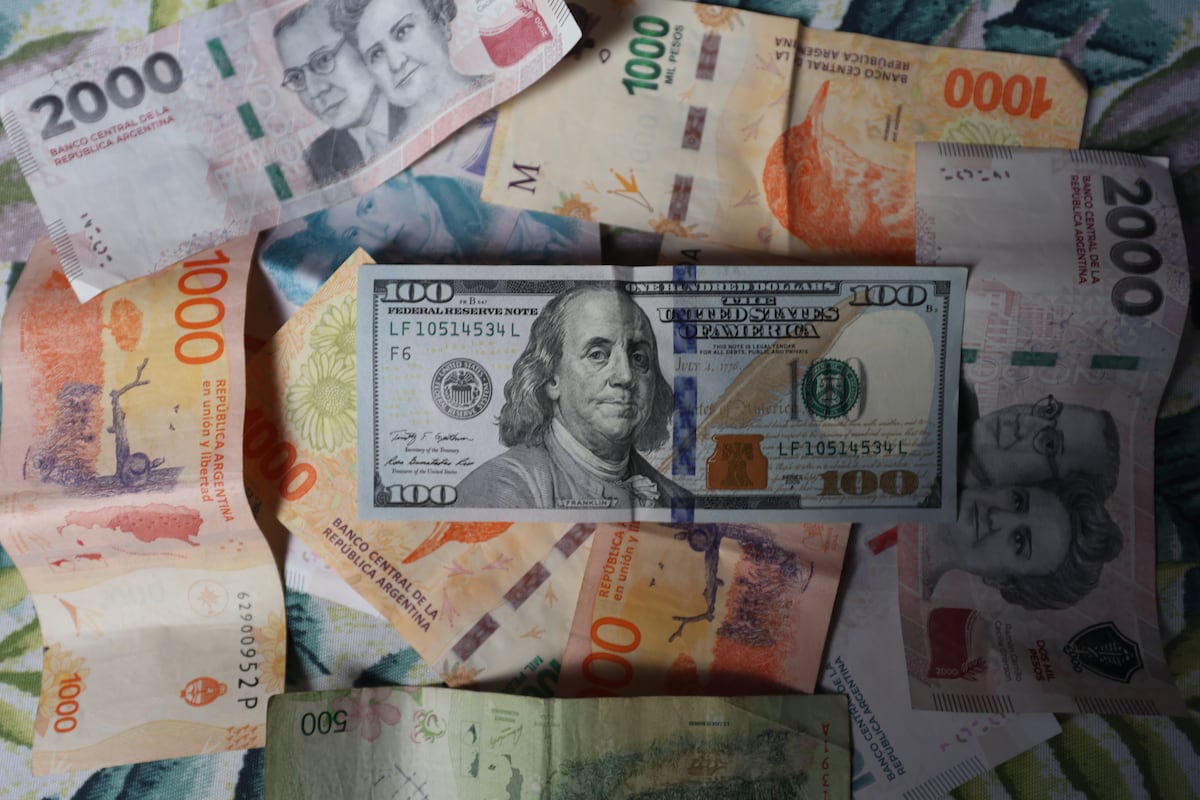Not even the support of the dollar manufacturer has managed to quell the demand for greenbacks in Argentina and the resulting depreciation of the peso. Donald Trump’s announcement of economic aid for his ally Javier Milei includes a $20 billion currency swap, a line of credit through private banks worth another $20 billion, and the repeated intervention of the United States Treasury in the Argentine foreign exchange market. But none of this, including the multiple measures taken by the South American country’s government, has managed to stabilize the financial market five days before Argentina holds midterm elections.
The peso fell again against the dollar on Tuesday, and the U.S. currency reached the maximum expected under the current floating band scheme: it finally closed at 1,490.5 pesos per wholesale dollar. Since April, when Milei lifted restrictions on foreign currency trading — the so-called “cepo” — the local currency has devalued by nearly 25%.
The widespread perception among Argentine financial market operators is that, after next Sunday’s elections, the right-wing government will modify, if not the direction, then at least key variables of an economic plan in jeopardy. Hence the record purchase of dollars, the usual safeguard Argentines take in the face of economic uncertainty.
The wholesale dollar exchange rate at 1,490.50 pesos represented an increase of 15.50 pesos since the previous day. The Central Bank of Argentina (BCRA) had to intervene by selling $45.5 million to keep the price below the upper floating range, currently at 1,491 pesos. The BCRA had not sold any of its meager dollar reserves since mid-September, when it sold $1.1 billion in just three days, a drain that was stopped with the first of the successive announcements of the U.S. bailout.
There were also expressions of support for Milei from the Trump administration on Tuesday. Treasury Secretary Scott Bessent confirmed what the Argentine government announced on Monday: the signing of a $20 billion currency swap, agreed upon last week. “Argentina now has the opportunity to embrace economic freedom, and our stabilization agreement is a bridge to a better economic future for Argentina, not a bailout,” Bessent posted on X. “We do not want another failed state in Latin America, and a strong, stable Argentina as a good neighbor is explicitly in the strategic interest of the United States.” His remarks were intended to respond to domestic criticism of Trump for aiding an allied president while his own administration suffers from the federal government shutdown.
The other leg of the U.S. aid package is a $20 billion loan for the South American country. The Treasury has reportedly entrusted the task to a group of private banks, including JPMorgan Chase, Bank of America, Goldman Sachs, and Citigroup, according to U.S. media. The Wall Street Journal reported on Tuesday that the banks are facing difficulties structuring the loan and are seeking assurances that they will be able to recover the funds they invest. Bankers are awaiting guidance from the Treasury Department on what guarantees Argentina could provide, or whether Washington plans to back the credit line on its own, the newspaper reported.
Trump’s support for Milei seems beyond doubt, but it has been accompanied by statements that have done little to dispel the lack of confidence in Argentina’s far-right government. When the U.S. president received Milei at the White House a week ago, he made the multimillion-dollar economic aid contingent on the uncertain outcome of Argentina’s midterm elections. This Monday, hours before the currency swap became official, Trump justified his concessions to Milei by saying that “Argentina’s fighting for its life,” “They have no money, they have no anything.”
Milei’s big bet was to reach Sunday’s legislative elections in a scenario of economic recovery and financial stability that would allow him to capitalize on what he considers his greatest achievement: the slowdown in inflation, sustained by monetary and fiscal adjustment and the exchange rate anchor. But his expectations have not been met. Not only that: allegations of corruption in his government and the crushing defeat of his party, La Libertad Avanza (Freedom Advances), in the Buenos Aires provincial elections in September further clouded the outlook. The same pollsters who, six months ago, predicted a landslide electoral victory for La Libertad Avanza, are now predicting a very close race with the left-wing Peronists.
Sign up for our weekly newsletter to get more English-language news coverage from EL PAÍS USA Edition
